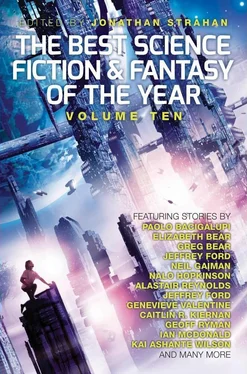THEDE’S EYES BURNED with wonder, staring up at the fretted sweep of the windscreen as we rose to meet it. We were deep in a days-long twilight; soon, the sun would set for weeks.
“This is not happening,” he said, and stepped closer to me. His voice shook with joy.
The elevator ride to the top of the city was obscenely expensive. We’d never been able to take it before. His mother had bought our tickets. Even for her, it hurt. I wondered why she hadn’t taken him herself.
“He’s getting bullied a lot in school,” she told me, on the phone. Behind her was the solid comfortable silence of a respectable home. My background noise was four men building towards a fight over a card game. “Also, I think he might be in love.”
But of course I couldn’t ask him about either of those things. The first was my fault; the second was something no boy wanted to discuss with his dad.
I pushed a piece of trough meat loose from between my teeth. Savored how close it came to the real thing. Only with Thede, with his mother’s money, did I get to buy the classy stuff. Normally it was barrel-bottom for me, greasy chunks that dissolved in my mouth two chews in, homebrew meat moonshine made in melt-scrap-furnace-heated metal troughs. Some grid cities were rumored to still have cows, but that was the kind of lie people tell themselves to make life a little less ugly. Cows were extinct, and real beef was a joy no one would ever experience again.
The windscreen was an engineering marvel, and absolutely gorgeous. It shifted in response to headwinds; in severe storms the city would raise its auxiliary windscreens to protect its entire circumference. The tiny panes of plastiglass were common enough – a thriving underground market sold the fallen ones as good luck charms – but to see them knitted together was to tremble in the face of staggering genius. Complex patterns of crenelated reliefs, efficiently diverting windshear no matter what angle it struck from. Bots swept past us on the metal gridlines, replacing panes that had fallen or cracked.
Once, hand gripping mine tightly, somewhere down in the city beneath me, six-year-old Thede had asked me how the windscreen worked. He asked me a lot of things then, about the locks that held the city up, and how they could rise in response to tides and ocean-level increases; about the big boats with strange words and symbols on the side, and where they went, and what they brought back. “What’s in that boat?” he’d ask, about each one, and I would make up ridiculous stories. “That’s a giraffe boat. That one brings back machine guns that shoot strawberries. That one is for naughty children.” In truth I only ever recognized ice boats, by the multitude of pincers atop cranes all along the side.
My son stood up straighter, sixty stories above his city. Some rough weight had fallen from his shoulders. He’d be strong, I saw. He’d be handsome. If he made it. If this horrible city didn’t break him inside in some irreparable way. If marauding whiteboys didn’t bash him for his dark skin. If the firms didn’t pass him over for the lack of family connections on his stuttering immigrant father’s side. I wondered who was bullying him, and why, and I imagined taking them two at a time and slamming their heads together so hard they popped like bubbles full of blood. Of course I couldn’t do that. I also imagined hugging him, grabbing him for no reason and maybe never letting go, but I couldn’t do that either. He would wonder why.
“I called last night and you weren’t in,” I said. “Doing anything fun?”
“We went to the cityoke arcade,” he said.
I nodded like I knew what that meant. Later on I’d have to ask the men in my room. I couldn’t keep up with this city, with its endlessly-shifting fashions and slang and the new immigrant clusters that cropped up each time I blinked. Twenty years after arriving, I was still a stranger. I wasn’t just Fresh Off the Boat, I was constantly getting back on the boat and then getting off again. That morning I’d gone to the job center for the fifth day in a row, and been relieved to find no boat postings. Only 12-month gigs, and I wasn’t that hungry yet. Booking a year-long job meant admitting you were old, desperate, unmoored, willing to accept payment only marginally more than nothing, for the privilege of a hammock and three bowls of trough slop a day. But captains picked their own crews for the shorter runs, and I worried that the lack of postings meant that with fewer boats going out the competition had become too fierce for me. Every day a couple hundred new workers arrived from sunken cities in India or Middle Europe, or from any of a hundred Water-War-torn nations. Men and women stronger than me, more determined.
With effort, I brought my mind back to the here and now. Twenty other people stood in the arc pod with us. Happy, wealthy people. I wondered if they knew I wasn’t one of them. I wondered if Thede was.
They smiled down at their city. They thought it was so stable. I’d watched ice sheets calf off the glacier that were five times the size of Qaanaaq. When one of those came drifting in our direction, the windscreen wouldn’t help us. The question was when, not if. I knew a truth they did not: how easy it is to lose something – everything – forever.
A Maoist Nepalese foreman, on one of my first ice ship runs, said white North Americans were the worst for adapting to the post-Arctic world, because we’d lived for centuries in a bubble of believing the world was way better than it actually was. Shielded by willful blindness and complex interlocking institutions of privilege, we mistook our uniqueness for universality.
I’d hated him for it. It took me fifteen years to see that he was right.
“What do you think of those two?” I asked, pointing with my chin at a pair of girls his age.
For a while he didn’t answer. Then he said, “I know you can’t help that you grew up in a backwards macho culture, but can’t you just keep that on the inside?”
My own father would have cuffed me if I talked to him like that, but I was too afraid of rupturing the tiny bit of affectionate credit I’d fought so hard to earn back.
His stance softened, then. He took a tiny step closer – the only apology I could hope for.
The pod began its descent. Halfway down he unzipped his jacket, smiling in the warmth of the heated pod while below-zero winds buffeted us. His T-shirt said The Last Calf , and showed the gangly sad-eyed hero of that depressing miserable movie all the kids adored.
“Where is it?” I asked. He’d proudly sported the NEW YORK F CKING CITY shirt on each of the five times I’d seen him since giving it to him.
His face darkened so fast I was frightened. His eyes welled up. He said, “Dad, I,” but his voice had the tremor that meant he could barely keep from crying. Shame was what I saw.
I couldn’t breathe, again, just like when I came home two weeks ago and he wasn’t happy to see me. Except seeing my son so unhappy hurt worse than fearing he hated me.
“Did somebody take it from you?” I asked, leaning in so no one else could hear me. “Someone at school? A bully?”
He looked up, startled. He shook his head. Then, he nodded.
“Tell me who did this?”
He shook his head again. “Just some guys, dad,” he said. “Please. I don’t want to talk about it.”
“Guys. How many?”
He said nothing. I understood about snitching. I knew he’d never tell me who.
“It doesn’t matter,” I said. “Okay? It’s just a shirt. I don’t care about it. I care about you. I care that you’re okay. Are you okay?”
Thede nodded. And smiled. And I knew he was telling the truth, even if I wasn’t, even if inside I was grieving the shirt, and the little boy who I once wrapped up inside it.
Читать дальше












